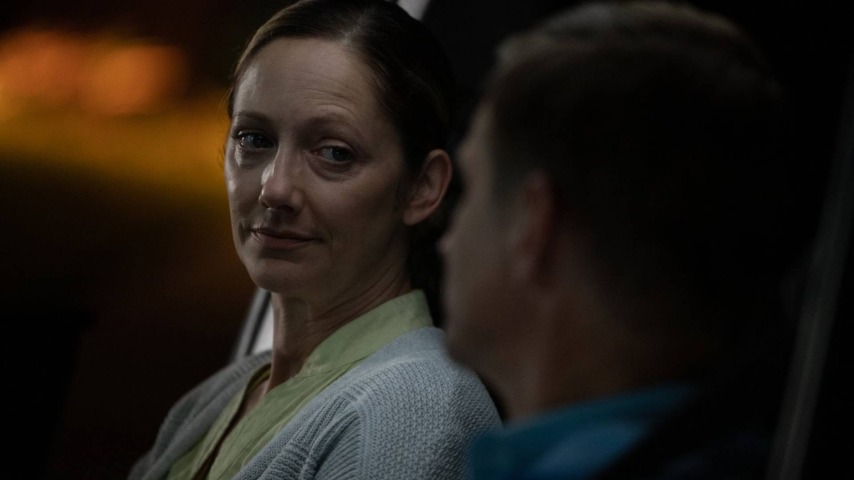As Adolescence dominates the television conversation around young male rage, internet supervision, and incel culture, Michael Shannon’s directorial debut, Eric LaRue, turns its attention towards the role of religion and the paradox of salvation when it comes to parents coping with the actions of their children. Similar to Adolescence, Shannon’s film also considers the culpability and coping methods of parents in the aftermath of tragedy.
Eric LaRue follows Janice (Judy Greer), who leads a doldrums life after her son kills three of his classmates. She struggles to hold onto her job and exhibits little interest in her fraying marriage, so she tentatively turns to her friendly Presbyterian pastor Steve (Paul Sparks). As Brett Neveu adapts his own play for the screen, Eric LaRue charts the dueling perspectives of both Janice and her husband, as they seek solace in rival religious congregations with drastically different viewpoints.
Formally subdued, in the typical minimalist shooting style of a stage adaptation, the film watches Janice sleepwalk through life. Neither emotionally frantic nor overwhelmed with rage, she is a confused husk, distant and disturbed, seeking answers and maybe a little forgiveness. Though a chance encounter between her and Steve at the grocery store sees Janice bristle at the ebullient pastor’s enthusiasm, she continues to seek him out. She acts detached yet receptive to the warmth Steve offers, and attracted to the opportunity for redemption that he presents. Pastor Steve wants to give Janice a safe space to confide in, but he also wants to organize a meeting between Janice and the mothers of the boys that Eric killed. He wants those affected by the tragedy to reach some sort of catharsis by speaking their minds to one another. Closing one door, and opening another, more positive one.
But the mothers are the hottest ticket in town—the opposing church, named “Redeemer,” is vying for a meeting between the three women as well. Redeemer preacher Bill Verne (Tracy Letts) espouses more conservative viewpoints and radical ways of approaching religion, all with the huckster showmanship of a snake oil salesman. This is the pastor with whom Janice’s husband Ron (Alexander Skarsgård) has decided to align, along with his eager coworker Lisa (Alison Pill).
Ron and Lisa form a close bond in their devotion to the teachings at Redeemer, despite Verne’s insistence on the subservience of the wife, urging Ron to remind Janice to “know her place.” It’s unclear if Ron held more traditionalist values than his wife prior to their son’s acts of violence, but the film offers little background on their marriage. Their relationship is cold and indifferent, their approach towards religion so at odds that it’s puzzling as to how the two got together in the first place. Ron and Janice often feel like two people who happen to live under the same roof.
Perhaps that’s the idea, that this tragedy forced the couple to come to terms with their opposing religious views. But their relationship is so underdeveloped as to be confounding. There’s also something unintentionally funny about Ron, from his goofy haircut to his unserious character, an easily swayed religious devotee looking for anything spiritually grounding to cling to. He is a narrative thread left undone, passed over in favor of Janice.
Greer, in a rare lead performance, anchors Janice’s contradictions using the very state of purgatory that the character lives in. Though Janice pushes back against Ron’s insistence that Jesus take their burdens from them, she does want to share her emotions. She quietly yearns to be aligned with the grieving mothers. Her reluctance to visit Eric appears to reinforce a desire to distance herself from her son’s actions and ally herself as a mother who lost her son. Greer has a perpetual furrow in her brow, carrying Eric LaRue on her back as she embodies a woman wrestling with clarity and culpability. The revealing climactic scene between Janice and Eric offers an intense heel turn, though it’s one that isn’t quite satisfying or illuminating. After a narrative which sees Janice uncertain of how she’s supposed to feel, her ultimate emotional honesty is at once striking and insufficient.
But again, Eric LaRue may be insisting that this is the point: That there are no easy answers, there is no catharsis, no “healing of wounds” that can happen through Pastor Steve’s well-meaning mediation. When faced with catastrophe, people reveal themselves as messy and imperfect. There is no one right way to grieve, and the grievers will act in ways that do not support a seamless and morally righteous cleansing. The endless deluge of shootings in America is consistently met with empty thoughts and prayers, and while Janice might view them as snake oil, she seeks a religious balm nonetheless—something indicative of the film’s incomplete evocation of the way people contort spirituality to their own ends. Though carried by a subtle and strenuous performance from Greer, Eric LaRue‘s intentionally unanswered questions do less to provoke than render the film a collage of well-meaning, half-finished sentiments.
Director: Michael Shannon
Writer: Brett Neveu
Starring: Judy Greer, Paul Sparks, Alison Pill, Tracy Letts, Annie Parisse, Alexander Skarsgård
Release Date: April 4, 2025









































